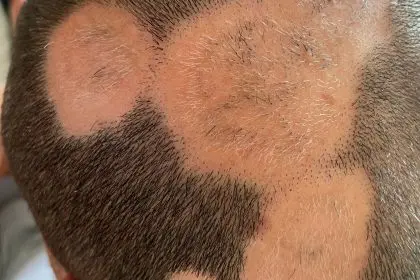The sight of thinning hair in the mirror has become an increasingly common experience for young men across America. While balding was once associated primarily with aging, experts now report a troubling rise in premature hair loss among men in their twenties and early thirties. This growing trend has sparked intense research into the complex factors driving early onset balding.
Understanding the genetic puzzle
Genetic predisposition emerges as a primary factor in early hair loss, with researchers identifying multiple inherited traits that influence male pattern baldness. The condition, scientifically known as androgenetic alopecia, often follows familiar patterns within families. Understanding your family history can provide valuable insights into potential hair loss risks and timeline.
Beyond genetics
While inherited traits play a significant role, modern research reveals a more complex picture of early balding. Environmental factors, lifestyle choices, and various medical conditions can accelerate hair loss even in men without strong genetic predispositions. This multifaceted understanding opens new avenues for prevention and treatment.
The stress connection
Modern lifestyles take a considerable toll on hair health. Chronic stress triggers elevated cortisol levels, directly impacting hair follicles and potentially accelerating hair loss. Young professionals facing high-pressure careers often experience this connection firsthand, as workplace stress contributes to premature thinning.
The hidden impact of daily habits
Seemingly innocent daily routines can significantly affect hair health. From aggressive styling practices to poor dietary choices, many young men unknowingly contribute to their hair loss through common habits. Identifying and modifying these behaviors can play a crucial role in maintaining healthy hair.
Nutrition’s crucial role
Diet emerges as a key factor in maintaining healthy hair growth. Essential nutrients like biotin, iron, and vitamins D and E play vital roles in supporting hair follicle health. Many young men’s diets lack these crucial elements, potentially accelerating hair loss or hindering natural growth cycles.
Medical conditions and medications
Various health conditions can trigger or accelerate hair loss in young men. Thyroid disorders, autoimmune conditions, and certain medications may contribute to premature balding. Understanding these potential triggers helps identify underlying causes and appropriate treatment approaches.
The emotional impact
Early hair loss often carries significant psychological weight for young men. The experience can affect self-esteem, social confidence, and even professional outlook. Recognizing and addressing these emotional aspects proves just as important as treating the physical symptoms.
Treatment options and solutions
Modern medicine offers various approaches to managing early hair loss. From FDA-approved medications like minoxidil and finasteride to advanced hair restoration procedures, treatment options continue expanding. Understanding available choices helps young men make informed decisions about their hair health.
Natural approaches gaining recognition
Alternative treatments and natural remedies show promising results for some men experiencing early hair loss. From scalp massage techniques to herbal supplements, these approaches offer additional options for those seeking natural solutions or complementary treatments.
Prevention strategies
Proactive measures can help maintain healthy hair growth and slow potential loss. Regular scalp care, proper nutrition, stress management, and gentle handling practices form the foundation of effective prevention strategies. Early intervention often yields better results in maintaining existing hair.
The importance of professional guidance
Consulting hair loss specialists early in the process can significantly impact treatment success. These experts can identify specific causes, recommend appropriate treatments, and monitor progress effectively. Professional guidance proves especially valuable when addressing early onset balding.
Lifestyle modifications
Making strategic lifestyle changes can positively impact hair health. Managing stress levels, improving sleep quality, and maintaining proper nutrition all contribute to healthier hair growth patterns. Small adjustments in daily routines often yield significant benefits over time.
Looking ahead
While early hair loss presents challenges, understanding its causes and available treatments provides hope for many young men. Continued research into genetic factors and new treatment approaches promises even more effective solutions in the future. The key lies in taking proactive steps and seeking appropriate guidance when needed.
The rising prevalence of premature hair loss among young men highlights the importance of understanding and addressing this condition early. Through a combination of medical treatments, lifestyle modifications, and proper hair care practices, many men successfully manage early balding. Remember that effective treatment starts with understanding your specific situation and working with qualified professionals to develop an appropriate management plan.

















